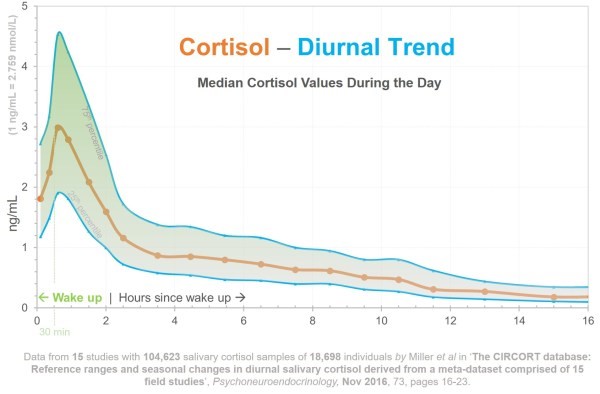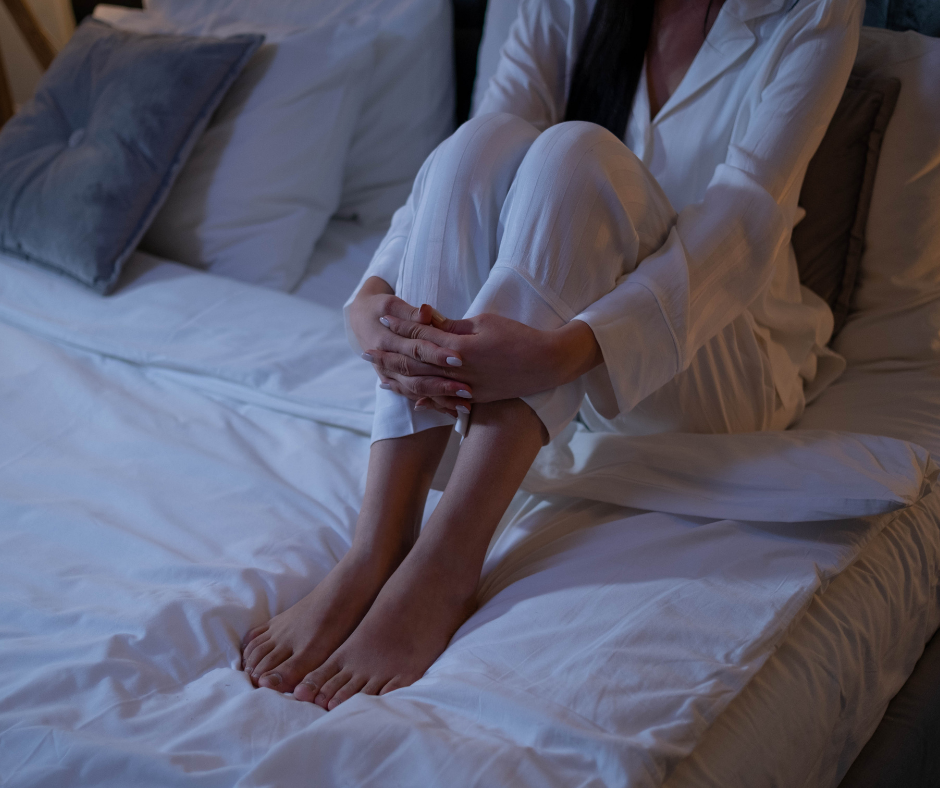One of the most common sleep complaints I hear in women, starting around age 30 and continuing for, well, too long, is that they have a problem staying asleep at night. They may or may not fall asleep easily, but they wake up, usually sometime between 1 AM and 3 AM, and have a very hard time getting back to sleep.
This happens to men as well, and I don’t have numbers to support this, but anecdotally this seems to be more of a problem in women than men.
There are several reasons why people wake up at night, some of which are:
- Sleep apnea
- Co-sleeping (with a partner or kids)
- Restless leg syndrome
- Other sleep disorders – sleep paralysis, different sleep patterns
- Heartburn
- Other hormones out of whack – hello menopause!
- Night sweats – sometimes related to perimenopause or menopause, also related to Yin deficiency (another story for another day)
These will be topics for another day though, because today I’m going to address the most common reason – an inappropriate spike in cortisol.
Cortisol is a hormone most people equate to stress, which is true. When our stress levels rise, cortisol rises as well. But even without any sources of stress in our day, cortisol has a natural pattern that it follows throughout the day.
Cortisol is at its lowest around 3 am and is meant to be at its highest around 7 AM (very approximately 1 hour after waking). As the day goes on, cortisol levels are meant to decrease, so that by the end of the day, cortisol levels should be pretty low. This is one of the things that helps us fall asleep at night (cortisol and melatonin’s behaviours are linked).
Below is a graph (from https://rxhometest.com/article/cortisol-risk-factors) that indicates the ideal curve for cortisol over the day, although there are definitely individual variations.

Waking up between 1 and 3 AM is, most commonly, due to a spike in cortisol at the wrong time. There are a number of factors that could cause this, but here are the most common:
- Low blood sugar (hypoglycemia)
- Anxiety and stress
- Your circadian rhythm is out of sync, and your body isn’t quite sure when to produce cortisol
- Depression
So, what’s the solution? Let’s break it down by cause:
Low blood sugar/Hypoglycemia – the solution to this is to improve your blood sugar regulation. There are two solutions for this, and they are completely opposite from each other. Both require a more in-depth explanation, but to keep things relatively simple for now, you can try one of these for 1 week, and the second one for another week to see which one works best for you:
- To regularly (like, every day) fast overnight. No eating past 7 PM, and no eating before 7-8 AM. This includes alcohol! You can have water after 7 PM.
- For those who overnight fasting doesn’t work for, a handful of nuts or seeds before bed can help keep blood sugar from dropping too low overnight
- No alcohol after supper/before bed
Anxiety/Stress – lowering your stress levels throughout the day, and later on in the day, can help keep your cortisol pattern more normal. So, how do we lower our cortisol levels in the afternoon/evening?
- Regular exercise
- Daily mindfulness practice (an app like Headspace or Insight Timer will work really well) – doing this at any time of day is helpful, but particularly helpful in the evening for this pattern of waking
- Yoga
- Journaling before bed
- See my blog post “The Real Reason You’re Burnt Out (And What To Do About It)” at elizabethbrothers.com.
Circadian rhythm
- NO (I repeat NO) vigorous exercise in the evening. Exercise absolutely increases cortisol, so if you’re going to move in the evening, nothing that is going to get you wired.
- Lower your lights in the evening. No screens, no overhead lights.
- Get morning light on your eyes every day (outside)
- Get afternoon/evening light on your eyes every day (outside)
- This is very closely tied to my previous blog about improving your melatonin levels to make it easier to fall asleep at night.
Depression
- This is a tricky one. I don’t have a set answer for this, but a cortisol spike at 9 PM has been associated with clinical depression. My best recommendation is to work through this the same way (and probably combining) the recommendations for anxiety/stress and circadian rhythm. In some cases, just setting your circadian clock correctly can help alleviate clinical depression.

Supplements
One of the most common sleep supplements is melatonin. Melatonin can help you fall asleep, but it generally doesn’t help you stay asleep. If you’re someone who wakes up at night, melatonin isn’t the place I would start, though if you try it and it works for you, go right ahead. There are a lot of supplements you can take to help improve your sleep maintenance via cortisol regulation, but rather than experimenting with those on your own, I would seek out a practitioner who can make a good recommendation based on your history, any risk factors you might have, any medications you might be on, and who really understands what’s going on with you. Find yourself a good naturopathic doctor – they can really help with this.
The one thing I will challenge you on with regards to supplements: is this going to be the long-term solution for you? By making habit and lifestyle changes, you’ll end up with long-lasting solutions to sleep issues. Supplements can work for the short term but relying on them for a long time might not be something you want to focus on.
One other note – in Chinese medicine, waking up between 1 and 3 AM is due to the Liver (the Chinese organ Liver, not the liver we think about in Western Medicine). The Liver is associated with anger, so if anger is an underlying emotion for you, this could be a trigger for you waking up at night. Acupuncture, Chinese herbs, and general Chinese Liver support can be helpful for this. This is a much larger story, and not one I’m an expert in, but if you’re curious, a TCM (Traditional Chinese Medicine) practitioner or a Naturopathic Doctor who does a lot of work with TCM might be worth looking into. Lots of people have found this to be very helpful.
The underlying reasons people wake up between 1 and 3 AM are going to vary for each person. What’s key is to use these recommendations as a starting point and start experimenting. If you know that you suffer from anxiety/stress, and you often wake up in the middle of the night (or early in the morning) with a racing mind, start there. If you also have a hard time falling asleep, start with some of the tips to regulate your circadian clock. It’s going to take some work to figure out what will be the answer for you. But if you have any questions, I’m here to help!
Elizabeth
